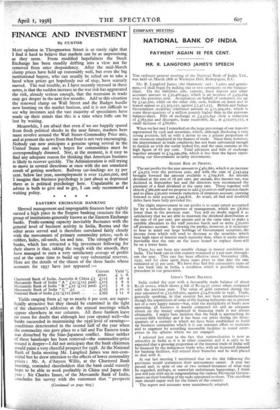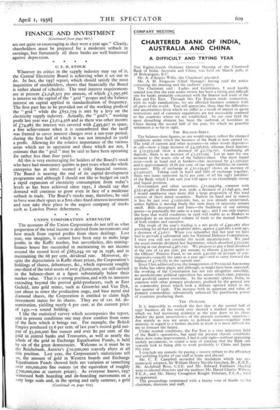EASTERN EXCHANGE BANKING
Shrewd management and impregnable finances have rightly earned a high place in the Empire banking structure for the group of institutions generally known as the Eastern Exchange banks. Profit-earning capacity inevitably fluctuates with the general level of business activity in India, Burma and the other areas served and is therefore correlated fairly closely with the movements of primary commodity prices, such as rubber, hides, oil-seeds, tea and jute. The strength of these banks, which has attracted a big investment following for their shares is that, taking the rough with the smooth, they have managed to earn a very satisfactory average of profits and at the same time to build up very substantial reserves. Here are the details of the shares of the three banks whose accounts for 1937 have just appeared :—
Current price. Yield %
s. d.
Chartered Bank of India, Australia & China £5 £ 111
5 18 9
Mercantile Bank of India " A " £25 (£121 paid)
£271 5 8 9 Mercantile Bank of India " B " £25 (£121 paid) £271 5 8 9 Mercantile Bank of India " C " £5 £13i
4 to 0
National Bank of India £25 (D21 paid) .. £391 5 13 6
Yields ranging from 41 up to nearly 6 per cent. are super- ficially attractive but they should be examined in the light of the chairmen's addresses at the annual meetings which appear elsewhere in our columns. All three bankers leave no room for doubt that although last year opened well—the banks succeeded in maintaining the 1936 level of earnings— conditions deteriorated in the second half of the year when the commodity rise gave place to a fall and Far Eastern trade was disturbed by the Sino-Japanese conflict. Since neither of these handicaps has been removed—the commodity-price wound is deeper—I did not anticipate that the bank chairmen would paint a very cheerful prospect for 1938. At the National Bank of India meeting Mr. Langford James was non-com- mittal but he drew attention to the effects of lower commodity prices ; Mr. A. d'Anyers Willis, at the Chartered Bank meeting, reminded shareholders that the bank could scarcely hope to be able to work profitably in China and Japan this year ; Sir Charles Innes, of the Mercantile Bank of India, concludes his survey with the statement that " prospects (Continued on page 609.)
FINANCE AND INVESTMENT
(Continued from page 607.) are not quite so encouraging as they were a year ago." Clearly, shareholders must be prepared for a moderate setback in earnings, but fortunately all three banks are well buttressed against depression.















































 Previous page
Previous page